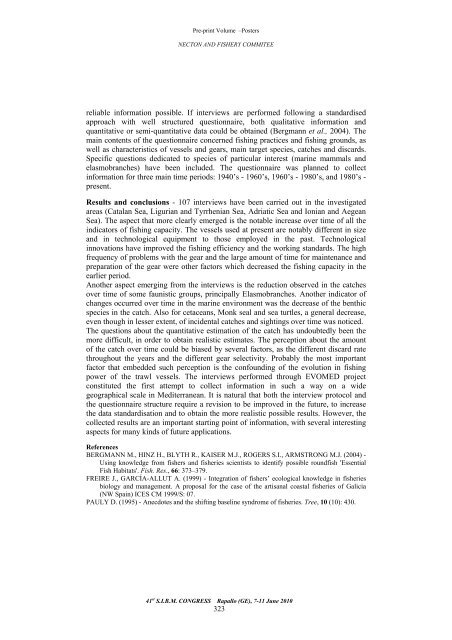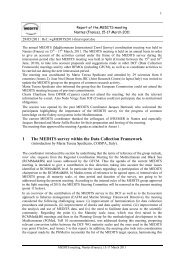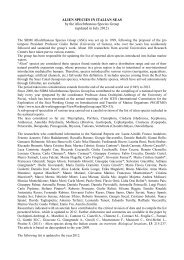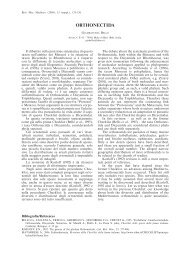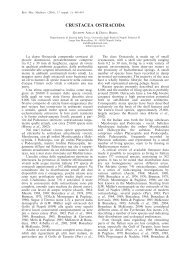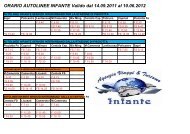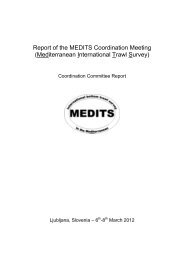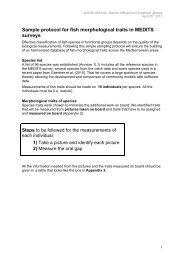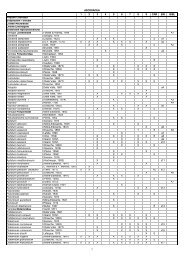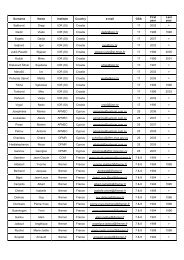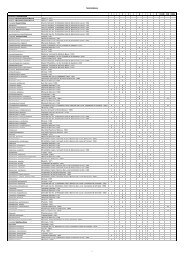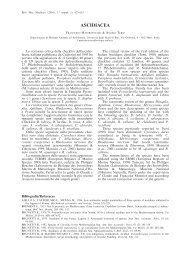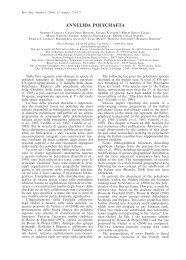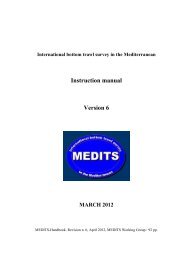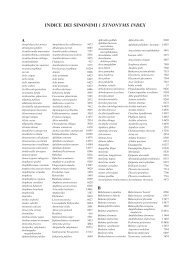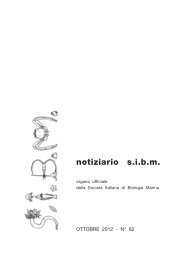- Page 2 and 3:
41 st Congress of the Società Ital
- Page 4 and 5:
Pre-print Volume ROGHI F., PARRAVIC
- Page 6 and 7:
Pre-print Volume Topic 3 / Tema 3 I
- Page 8 and 9:
Pre-print Volume CARLUCCI R., CAPEZ
- Page 10 and 11:
Pre-print Volume PORPORATO E., MANG
- Page 12 and 13:
Pre-print Volume SOCAL G., BERNARDI
- Page 14 and 15:
Pre-print Volume - Opening keynote
- Page 16 and 17:
Pre-print Volume - Opening keynote
- Page 18 and 19:
Pre-print Volume - Introductory lec
- Page 20 and 21:
Pre-print Volume - Introductory lec
- Page 22 and 23:
Pre-print Volume -Lecture Topic 1:
- Page 24 and 25:
Pre-print Volume -Lecture Topic 1:
- Page 26 and 27:
Pre-print Volume - Invited presenta
- Page 28 and 29:
Pre-print Volume - Invited presenta
- Page 30 and 31:
Pre-print Volume - Invited presenta
- Page 32 and 33:
Pre-print Volume - Oral presentatio
- Page 34 and 35:
Pre-print Volume - Oral presentatio
- Page 36 and 37:
Pre-print Volume - Oral presentatio
- Page 38 and 39:
Pre-print Volume - Oral presentatio
- Page 40 and 41:
Pre-print Volume - Oral presentatio
- Page 42 and 43:
Pre-print Volume - Oral presentatio
- Page 44 and 45:
Pre-print Volume - Oral presentatio
- Page 46 and 47:
Pre-print Volume - Oral presentatio
- Page 48 and 49:
Pre-print Volume - Oral presentatio
- Page 50 and 51:
Pre-print Volume - Oral presentatio
- Page 52 and 53:
Pre-print Volume - Oral presentatio
- Page 54 and 55:
Pre-print Volume - Oral presentatio
- Page 56 and 57:
Pre-print Volume - Oral presentatio
- Page 58 and 59:
Pre-print Volume - Oral presentatio
- Page 60 and 61:
Pre-print Volume - Oral presentatio
- Page 62 and 63:
Pre-print Volume - Oral presentatio
- Page 64 and 65:
Pre-print Volume - Oral presentatio
- Page 66 and 67:
Pre-print Volume - Oral presentatio
- Page 68 and 69:
Pre-print Volume - Oral presentatio
- Page 70 and 71:
Pre-print Volume - Oral presentatio
- Page 72 and 73:
Pre-print Volume - Oral presentatio
- Page 74 and 75:
Pre-print Volume - Oral presentatio
- Page 76 and 77:
Pre-print Volume - Oral presentatio
- Page 78 and 79:
Pre-print Volume - Oral presentatio
- Page 80 and 81:
Pre-print Volume - Posters Topic 1:
- Page 82 and 83:
Pre-print Volume - Posters Topic 1:
- Page 84 and 85:
Pre-print Volume - Posters Topic 1:
- Page 86 and 87:
Pre-print Volume - Posters Topic 1:
- Page 88 and 89:
Pre-print Volume - Posters Topic 1:
- Page 90 and 91:
Pre-print Volume - Introductory lec
- Page 92 and 93:
Pre-print Volume - Introductory lec
- Page 94 and 95:
Pre-print Volume - Invited presenta
- Page 96 and 97:
Pre-print Volume - Invited presenta
- Page 98 and 99:
Pre-print Volume - Oral presentatio
- Page 100 and 101:
Pre-print Volume - Oral presentatio
- Page 102 and 103:
Pre-print Volume - Oral presentatio
- Page 104 and 105:
Pre-print Volume - Oral presentatio
- Page 106 and 107:
Pre-print Volume - Oral presentatio
- Page 108 and 109:
Pre-print Volume - Oral presentatio
- Page 110 and 111:
Pre-print Volume - Oral presentatio
- Page 112 and 113:
Phytoplankton Groups kg C m -3 3.00
- Page 114 and 115:
Pre-print Volume - Oral presentatio
- Page 116 and 117:
Pre-print Volume - Oral presentatio
- Page 118 and 119:
Pre-print Volume - Oral presentatio
- Page 120 and 121:
Pre-print Volume - Oral presentatio
- Page 122 and 123:
Pre-print Volume - Oral presentatio
- Page 124 and 125:
Pre-print Volume - Oral presentatio
- Page 126 and 127:
Pre-print Volume - Oral presentatio
- Page 128 and 129:
Pre-print Volume - Posters Topic 2:
- Page 130 and 131:
Pre-print Volume - Posters Topic 2:
- Page 132 and 133:
Pre-print Volume - Posters Topic 2:
- Page 134 and 135:
Pre-print Volume - Posters Topic 2:
- Page 136 and 137:
Pre-print Volume - Posters Topic 2:
- Page 138 and 139:
Pre-print Volume - Posters Topic 2:
- Page 140 and 141:
Pre-print Volume - Oral presentatio
- Page 142 and 143:
Pre-print Volume - Oral presentatio
- Page 144 and 145:
Pre-print Volume - Oral presentatio
- Page 146 and 147:
Pre-print Volume - Oral presentatio
- Page 148 and 149:
Pre-print Volume - Oral presentatio
- Page 150 and 151:
Pre-print Volume - Oral presentatio
- Page 152 and 153:
Pre-print Volume - Oral presentatio
- Page 154 and 155:
Pre-print Volume - Oral presentatio
- Page 156 and 157:
Pre-print Volume - Oral presentatio
- Page 158 and 159:
Pre-print Volume - Oral presentatio
- Page 160 and 161:
Genoa Sestri Levante Pre-print Volu
- Page 162 and 163:
Pre-print Volume - Oral presentatio
- Page 164 and 165:
Pre-print Volume - Oral presentatio
- Page 166 and 167:
Pre-print Volume - Oral presentatio
- Page 168 and 169:
Pre-print Volume - Oral presentatio
- Page 170 and 171:
Pre-print Volume - Oral presentatio
- Page 172 and 173:
Pre-print Volume - Posters Topic 3:
- Page 174 and 175:
Pre-print Volume - Posters Topic 3:
- Page 176 and 177:
Pre-print Volume - Posters Topic 3:
- Page 178 and 179:
Pre-print Volume - Posters Topic 3:
- Page 180 and 181:
Pre-print Volume - Posters Topic 3:
- Page 182 and 183:
Pre-print Volume - Posters Topic 3:
- Page 184 and 185:
Pre-print Volume - Posters Topic 3:
- Page 186 and 187:
Pre-print Volume - Posters Topic 3:
- Page 188 and 189:
Pre-print Volume - Posters Topic 3:
- Page 190 and 191:
Pre-print Volume - Posters Topic 3:
- Page 192 and 193:
Pre-print Volume - Posters Topic 3:
- Page 194 and 195:
Pre-print Volume -Invited presentat
- Page 196 and 197:
Pre-print Volume -Invited presentat
- Page 198 and 199:
Pre-print Volume -Invited presentat
- Page 200 and 201:
Pre-print Volume -Oral presentation
- Page 202 and 203:
Pre-print Volume -Oral presentation
- Page 204 and 205:
Pre-print Volume -Oral presentation
- Page 206 and 207:
Pre-print Volume -Oral presentation
- Page 208 and 209:
Pre-print Volume -Oral presentation
- Page 210 and 211:
Pre-print Volume -Oral presentation
- Page 212 and 213:
Pre-print Volume -Oral presentation
- Page 214 and 215:
Pre-print Volume -Oral presentation
- Page 216 and 217:
Pre-print Volume -Oral presentation
- Page 218 and 219:
Pre-print Volume -Oral presentation
- Page 220 and 221:
Pre-print Volume -Posters Topic 4:
- Page 222 and 223:
15 % Scyliorhinus canicula 12 GRUND
- Page 224 and 225:
Pre-print Volume -Posters Topic 4:
- Page 226 and 227:
Pre-print Volume -Posters Topic 4:
- Page 228 and 229:
Pre-print Volume -Posters Topic 4:
- Page 230 and 231:
Pre-print Volume -Posters Topic 4:
- Page 232 and 233:
Pre-print Volume -Posters Topic 4:
- Page 234 and 235:
Pre-print Volume -Posters Topic 4:
- Page 236 and 237:
Pre-print Volume -Posters Topic 4:
- Page 238 and 239:
Pre-print Volume -Posters Topic 4:
- Page 240 and 241:
Pre-print Volume - Posters AQUACULT
- Page 242 and 243:
Pre-print Volume - Posters AQUACULT
- Page 244 and 245:
Pre-print Volume - Posters AQUACULT
- Page 246 and 247:
Pre-print Volume - Posters AQUACULT
- Page 248 and 249:
Pre-print Volume - Posters AQUACULT
- Page 250 and 251:
Pre-print Volume - Posters AQUACULT
- Page 252 and 253:
Pre-print Volume - Posters AQUACULT
- Page 254 and 255:
Pre-print Volume - Posters AQUACULT
- Page 256 and 257:
Pre-print Volume - Posters AQUACULT
- Page 258 and 259:
Pre-print Volume BENTHOS COMMITEE B
- Page 260 and 261:
Pre-print Volume - Posters BENTHOS
- Page 262 and 263:
Pre-print Volume - Posters BENTHOS
- Page 264 and 265:
Pre-print Volume - Posters BENTHOS
- Page 266 and 267:
Pre-print Volume - Posters BENTHOS
- Page 268 and 269:
Pre-print Volume - Posters BENTHOS
- Page 270 and 271:
Pre-print Volume - Posters BENTHOS
- Page 272 and 273:
Pre-print Volume - Posters BENTHOS
- Page 274 and 275: Pre-print Volume - Posters BENTHOS
- Page 276 and 277: Pre-print Volume - Posters BENTHOS
- Page 278 and 279: Pre-print Volume - Posters BENTHOS
- Page 280 and 281: Pre-print Volume - Posters BENTHOS
- Page 282 and 283: Pre-print Volume - Posters BENTHOS
- Page 284 and 285: Pre-print Volume - Posters BENTHOS
- Page 286 and 287: Pre-print Volume - Posters BENTHOS
- Page 288 and 289: Pre-print Volume - Posters BENTHOS
- Page 290 and 291: Pre-print Volume - Posters MANAGEME
- Page 292 and 293: Pre-print Volume - Posters MANAGEME
- Page 294 and 295: Pre-print Volume - Posters MANAGEME
- Page 296 and 297: Pre-print Volume - Posters MANAGEME
- Page 298 and 299: Pre-print Volume - Posters MANAGEME
- Page 300 and 301: Pre-print Volume - Posters MANAGEME
- Page 302 and 303: Pre-print Volume - Posters MANAGEME
- Page 304 and 305: Pre-print Volume - Posters MANAGEME
- Page 306 and 307: Pre-print Volume NECTON AND FISHERY
- Page 308 and 309: Pre-print Volume -Posters NECTON AN
- Page 310 and 311: Pre-print Volume -Posters NECTON AN
- Page 312 and 313: Pre-print Volume -Posters NECTON AN
- Page 314 and 315: Pre-print Volume -Posters NECTON AN
- Page 316 and 317: Pre-print Volume -Posters NECTON AN
- Page 318 and 319: Pre-print Volume -Posters NECTON AN
- Page 320 and 321: Pre-print Volume -Posters NECTON AN
- Page 322 and 323: Pre-print Volume -Posters NECTON AN
- Page 326 and 327: Pre-print Volume -Posters NECTON AN
- Page 328 and 329: Pre-print Volume -Posters NECTON AN
- Page 330 and 331: Pre-print Volume -Posters NECTON AN
- Page 332 and 333: Pre-print Volume -Posters NECTON AN
- Page 334 and 335: Pre-print Volume - Posters PLANKTON
- Page 336 and 337: Pre-print Volume - Posters PLANKTON
- Page 338 and 339: Pre-print Volume - Posters PLANKTON
- Page 340 and 341: Pre-print Volume - Posters PLANKTON
- Page 342 and 343: Pre-print Volume - Posters PLANKTON
- Page 344 and 345: Pre-print Volume - Posters PLANKTON
- Page 346 and 347: Pre-print Volume VARIOUS TOPICS VAR
- Page 348 and 349: Pre-print Volume - Posters VARIOUS
- Page 350 and 351: Pre-print Volume - Posters VARIOUS
- Page 352 and 353: Pre-print Volume - Posters VARIOUS
- Page 354 and 355: Pre-print Volume - Posters VARIOUS
- Page 356 and 357: Pre-print Volume - Posters VARIOUS
- Page 358 and 359: Pre-print Volume - Posters VARIOUS
- Page 360 and 361: Pre-print Volume - Posters VARIOUS
- Page 362 and 363: Pre-print Volume - Posters VARIOUS
- Page 364 and 365: Pre-print Volume - Posters VARIOUS
- Page 366 and 367: Pre-print Volume - Posters VARIOUS
- Page 368 and 369: Pre-print Volume - Posters VARIOUS
- Page 370 and 371: Castellano M.......................
- Page 372 and 373: Maravelias C.......................
- Page 374:
Traversi I. .......................


